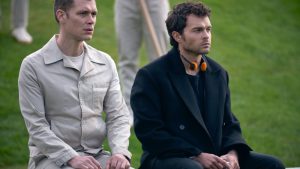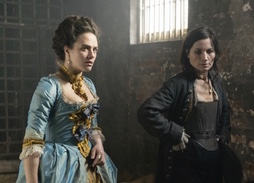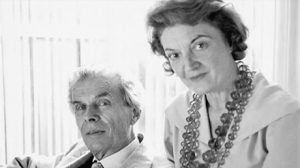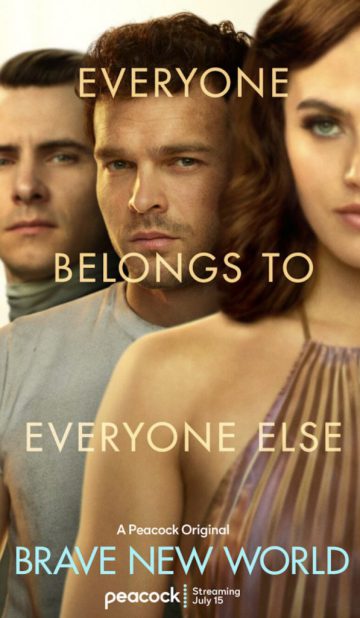The Reel Review
This original sci-fi series on NBC’s fledging Peacock streaming platform is about a dystopian future where there is no privacy, no family and no monogamy – where heavily-medicated, hedonistic citizens of New London are conceived in test tubes into a rigid caste system and must sacrifice individuality to ensure their happiness and security. It is an adaptation of the groundbreaking 1931 novel by Aldous Huxley.

Jessica Brown-Findlay (Lady Sybil from TV’s Downton Abbey) is Lenina, a scientist who, along with a government-sanctioned pill dispenser played by Harry Lloyd (The Theory of Everything, Game of Thrones) are sent to visit the Savagelands, a theme park where New London tourists can gawk at the miserable, poverty-stricken residents of the old world. When an uprising occurs, a Savageland worker (Aiden Ehrenreich from Solo: A Star Wars Story) and his mother (Demi Moore) return with them to New London, disrupting their status quo.

Not surprisingly, the series deviates quite a bit from Huxley’s nearly century old novel, which itself was spawned by anxieties stemming from 1928’s Great Depression – particularly timely, given our current pandemic and global economic crisis. The show starts off with a slick, futuristic look – and a heaping amount of sex orgies – apparently to drive home the point that the new world is a hedonistic one featuring LOTS of group sex.
Had the quick pacing of the first three episodes continued throughout all nine episodes, this familiar take on the conflict between individuality and society could have been truly compelling. Unfortunately, the latter half of the series just isn’t that interesting. The distractingly outdated costuming on Findlay-Brown also looks straight up Nomi Malone in Showgirls. But the series does prove – literally – that travel is the great opener of minds.
REEL FACTS
• Brave New World is Aiden Ehrenreich’s first film role since 2018’s Solo: A Star Wars Story.

• Jessica Brown-Findlay (Lenina) and Kate Fleetwood (Sheila) worked together in the Hulu series Harlots.

• While the dystopian “Brave New World” was author Aldous Huxley’s biggest success, his final novel, 1962’s “Island,” was his vision of utopia. Huxley, who had experimented with mind altering drugs throughout his life, died from cancer of the larynx at the age of 69 on November 23, 1963, the same day President John F. Kennedy was assassinated, and just hours after having his wife inject him with LSD on his deathbed so he could trip his way out of the world.



